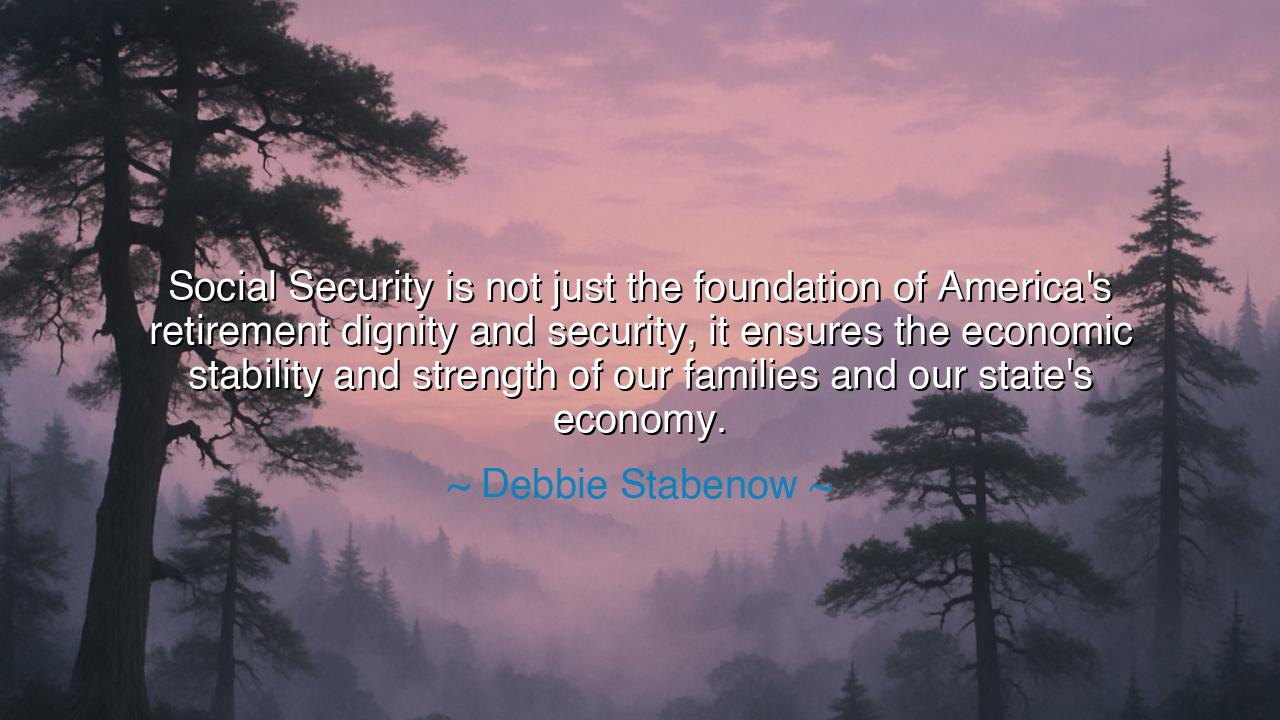
Social Security is not just the foundation of America's
Social Security is not just the foundation of America's retirement dignity and security, it ensures the economic stability and strength of our families and our state's economy.






Debbie Stabenow, servant of the people and guardian of their welfare, spoke these words with clarity and conviction: “Social Security is not just the foundation of America’s retirement dignity and security, it ensures the economic stability and strength of our families and our state’s economy.” In this saying, she lifts our eyes beyond mere policy, to see in Social Security not only a system of numbers, but a covenant — a promise between generations, a bond woven into the very fabric of society.
The meaning is this: in every civilization, the strength of the community is revealed in how it guards its most vulnerable. The young may run with vigor, the strong may labor with pride, but the old who have given their years in toil deserve dignity in their rest. Social Security is not charity, but justice; not a gift, but a rightful return. It ensures that those who once built, raised, and defended shall not in their twilight years be cast into poverty, but shall dwell in safety, sustained by the very society they once sustained.
Its origin lies in the trials of the Great Depression. When America was brought low by economic collapse, when families were scattered and elders were left destitute, leaders sought a way to bind the nation’s wounds. Out of this crucible was born the Social Security Act of 1935, a shield forged for the people. From that day, the burden of despair was lifted from countless households, and the nation learned that collective care brings collective strength. Thus, Social Security became not only a safety net, but the cornerstone of economic stability itself.
History shows us again and again the power of such bonds. In ancient Israel, the Law commanded that the widow, the orphan, and the stranger be cared for, lest society be judged wanting. In Rome, the grain dole ensured that citizens did not starve when famine struck. In each age, the people learned that to abandon the vulnerable was to weaken the whole, but to protect them was to build endurance and strength for all. Stabenow’s words echo this eternal truth: that when families are secure, economies thrive, and when elders walk with dignity, the state itself is made stable.
Consider the story of Mary, a widow of Michigan who, after her husband’s passing, relied upon Social Security to keep her home and to provide for her grandchildren who came under her care. Without it, she would have fallen into hardship; with it, she became the pillar of her family. Her security was not hers alone — it rippled outward, sustaining children, supporting local shops, and strengthening the fabric of her community. Thus, Social Security proves itself not merely a safeguard for individuals, but a wellspring of prosperity for the wider economy.
The lesson is clear: the measure of a people is not found in their monuments or their armies, but in the way they protect those who can no longer protect themselves. Social Security is not merely about retirement — it is about family, community, and the enduring promise that no citizen shall be left behind. Each generation contributes, and in turn, each generation receives. This is the cycle of justice, the rhythm of society that binds past, present, and future together.
Therefore, my children, let this wisdom be written upon your hearts: dignity and security in old age are not luxuries, but rights; and the safeguarding of those rights strengthens not only the individual, but the whole. Support what builds stability. Defend what grants dignity. Teach your children that in protecting the weak, they preserve the strong. In this way, you will ensure that the foundations of your society remain unshaken, and that the promise of security endures for generations yet unborn.






AAdministratorAdministrator
Welcome, honored guests. Please leave a comment, we will respond soon